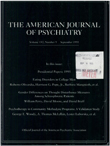The neuropsychological signature of schizophrenia: generalized or differential deficit?
Abstract
OBJECTIVE: The aim of this study was to provide a comprehensive assessment of neuropsychological functioning in schizophrenia so as to evaluate hypotheses of lateralized or differential cognitive impairment in this disorder. Furthermore, the study sought to address the potentially confounding factors of medication side effects and relevant demographic variables such as age, education, gender, and handedness. METHOD: The neuropsychological functioning of 28 schizophrenic patients whose medication had been withdrawn for research purposes and 15 demographically matched normal subjects was evaluated. A comprehensive battery of tasks was used to determine whether performance patterns of schizophrenic patients were consistent with models of lateralized or localized neuropsychological impairment in schizophrenia. To facilitate comparison with results of other studies, several analytic strategies were used, including comparisons of group performance on individual tests, composite function scores, and evaluation of performance based on "clinical" criteria of impairment. RESULTS: In contrast to the normal subjects, the schizophrenic patients displayed impairment across measures of motor, sensory, and perceptual functioning, verbal and nonverbal memory, and indexes of frontal lobe functioning. This pattern of generalized dysfunction was evident regardless of the method of analysis used to assess performance. CONCLUSIONS: These findings fail to support conjectures regarding differential neurocognitive deficits in schizophrenia. However, the psychometric limitations of currently available neuropsychological measures may obscure the finding of differential impairment and must be considered in interpreting the results of this study as well as those of any investigation using such instruments.
Access content
To read the fulltext, please use one of the options below to sign in or purchase access.- Personal login
- Institutional Login
- Sign in via OpenAthens
- Register for access
-
Please login/register if you wish to pair your device and check access availability.
Not a subscriber?
PsychiatryOnline subscription options offer access to the DSM-5 library, books, journals, CME, and patient resources. This all-in-one virtual library provides psychiatrists and mental health professionals with key resources for diagnosis, treatment, research, and professional development.
Need more help? PsychiatryOnline Customer Service may be reached by emailing [email protected] or by calling 800-368-5777 (in the U.S.) or 703-907-7322 (outside the U.S.).



